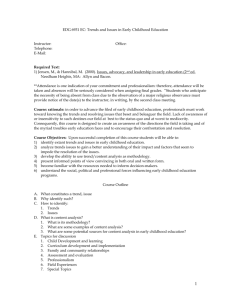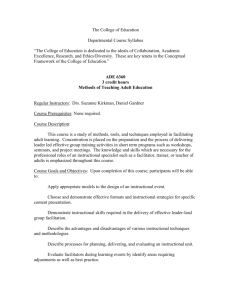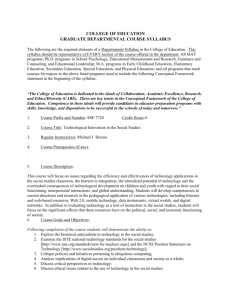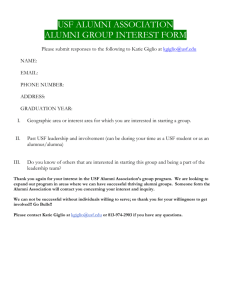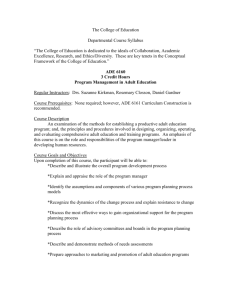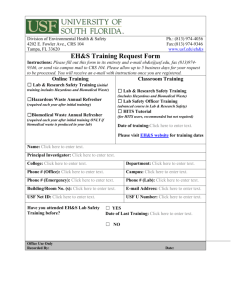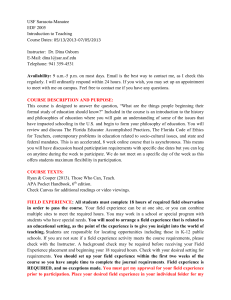College of Education - University of South Florida
advertisement
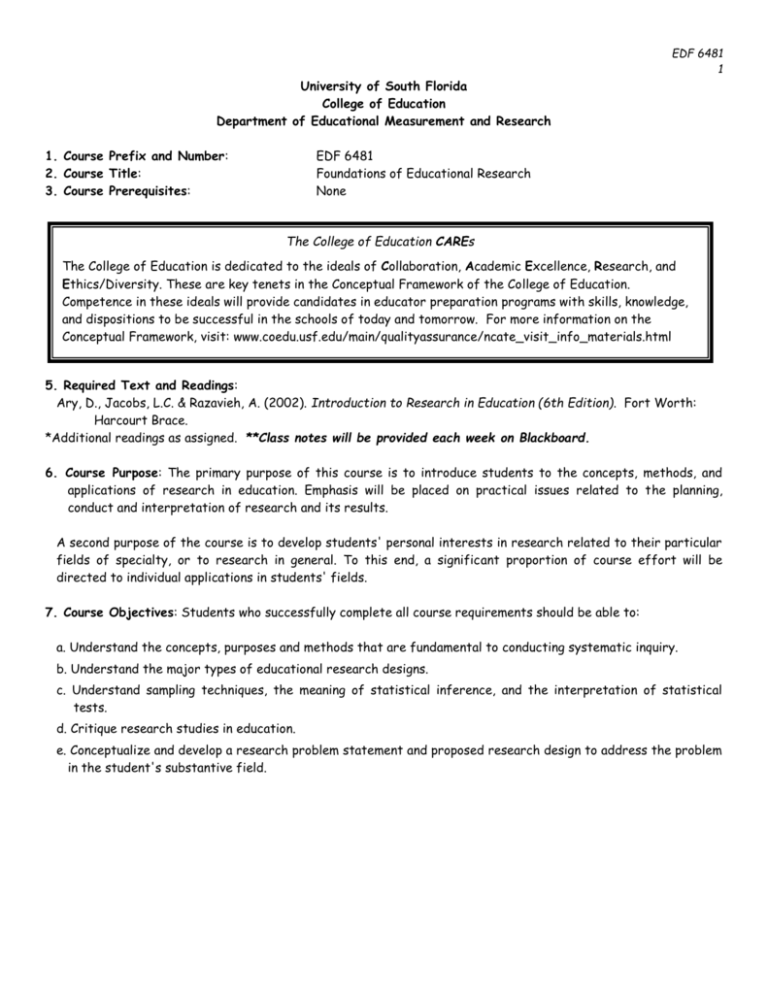
EDF 6481 1 University of South Florida College of Education Department of Educational Measurement and Research 1. Course Prefix and Number: 2. Course Title: 3. Course Prerequisites: EDF 6481 Foundations of Educational Research None The College of Education CAREs The College of Education is dedicated to the ideals of Collaboration, Academic Excellence, Research, and Ethics/Diversity. These are key tenets in the Conceptual Framework of the College of Education. Competence in these ideals will provide candidates in educator preparation programs with skills, knowledge, and dispositions to be successful in the schools of today and tomorrow. For more information on the Conceptual Framework, visit: www.coedu.usf.edu/main/qualityassurance/ncate_visit_info_materials.html 5. Required Text and Readings: Ary, D., Jacobs, L.C. & Razavieh, A. (2002). Introduction to Research in Education (6th Edition). Fort Worth: Harcourt Brace. *Additional readings as assigned. **Class notes will be provided each week on Blackboard. 6. Course Purpose: The primary purpose of this course is to introduce students to the concepts, methods, and applications of research in education. Emphasis will be placed on practical issues related to the planning, conduct and interpretation of research and its results. A second purpose of the course is to develop students' personal interests in research related to their particular fields of specialty, or to research in general. To this end, a significant proportion of course effort will be directed to individual applications in students' fields. 7. Course Objectives: Students who successfully complete all course requirements should be able to: a. Understand the concepts, purposes and methods that are fundamental to conducting systematic inquiry. b. Understand the major types of educational research designs. c. Understand sampling techniques, the meaning of statistical inference, and the interpretation of statistical tests. d. Critique research studies in education. e. Conceptualize and develop a research problem statement and proposed research design to address the problem in the student's substantive field. EDF 6481 2 8. Course Outline: Date Week # Topics Readings & Assignments 1 Course overview [16, 17] 2 Literature Review CH 4 Searching: Library Resources *Find an empirical article Ways of Knowing CH 1, 2 3 Purposes and Types of Educational Research Types of Variables 4 Problems and Hypotheses CH 3, 5 5 Descriptive Statistics CH 6 6 Descriptive Statistics (cont.) 7 Research Topics Research Questions *Takehome exam distributed Reviewing the Literature 9 Midterm Exam 11 Measurement: Reliability and Validity CH 8, 9 12 Measurement (Cont.) CH 7 Sampling & Inferential Statistics 13 Sampling and Inferential Statistics (cont.) 14 No Class Research Conference 15 No Class Thanksgiving 16 Experimental Designs *Article review due CH 10, 11, 12 Causal Comparative Method Correlational Designs 17 Descriptive Research CH 13, 14, 15 Survey Research *Research Proposals due Qualitative Research / Mixed Methods 16 Final Exam EDF 6481 3 9. Criteria for Evaluation of Student Performance: Each student is expected to complete the reading assignments in the text and any supplementary readings prior to the class session. Basic familiarity with the material will increase learning in the classroom. In addition, each student is encouraged to complete homework exercises whether or not the homework is collected and graded. Attendance is not mandatory but encouraged. The final course grade will be computed as a weighted combination of (a) homework assignments, (b) article review, (c) research proposal, and (d) examinations: Mid-term exam 30% Final exam 30% Research proposal 20% Homework 10% Article review 10% Criteria for Article Review: Complete an outline of the following methodological issues as they pertain to the research article: 1. Identify the primary research question(s) being investigated. 2. Identify the variables investigated in the research and their level of measurement. 3. Identify the population of interest and the sampling procedure employed. 4. Identify the descriptive statistics reported in the research. Are these statistics appropriate and adequate to describe the data? Why are they appropriate and adequate? If no statistics were used, describe the method by which the data were analyzed. 5. Identify one inherent strength and one potential weakness in the study. 6. Briefly state the substantive conclusions supported by the research. This article review is due on _______________. For the final 20% of the course grade, students will complete a small proposal for an empirical research project. You will not have to actually conduct the study. The following topics must be addressed in your proposal: 1. State your research questions - these questions should include mention of the population of interest and the variable(s) you are focusing on. 2. Importance of the study (practical or theoretical significance). 3. Summarize at least five empirical studies that relate to your research question. Your summary should include a description of the sampling procedure, sample size, research design, instrumentation used, analyses, results, conclusions, etc. 4. Discuss the strengths and limitations of each studies. Describe how your proposed study differs or is an extension of such previous research. 5. Describe the type of research design that you propose to answer your research question (e.g., qualitative, experimental, correlational, causal-comparative). 6. Describe the number and types of participants that you propose to include in your research. Describe the sampling procedure that you propose to employ. 7. Identify the variables in your study and describe how you plan to measure these variables. Describe how you plan to analyze your data. What do you expect to find? 8. List of references formatted in APA style. **The proposal is due on ______________ EDF 6481 4 10. ADA Statement: Students with disabilities are responsible for registering with the Office of Student Disabilities Services in order to receive special accommodations and services. Please notify the instructor during the first week of classes if a reasonable accommodation for a disability is needed for this course. A letter from the USF Disability Services Office must accompany this request. 11. USF Policy on Religious Observances: Students who anticipate the necessity of being absent from class due to the observation of a major religious observance must provide notice of the date(s) to the instructor, in writing, by the second class meeting. 12. Grading System and Criteria: 90 – 80 – 70 – 60 – <60 100 89 79 69 A B C D F “No grade below “C” will be accepted toward a graduate degree. This includes C minus grades.” 13. Web Portal Information: A helios account, which is the official USF e-mail account, is given to every USF student when enrolled. Every official USF correspondence to students will be sent to the helios account. More information about this and the USF Web Portal can be found at: http://www.acomp.usf/portal.html 14. Academic Dishonesty: More information can be found in the on-line Graduate Catalog: (http://catalog.grad.usf.edu/2001-2003/section8.asp#academic%20conduct). Plagiarism is defined as “literary theft” and consists of the unattributed quotation of the exact words of a published text, or the unattributed borrowing of original ideas by paraphrase from a published text. On written papers for which the student employs information gathered from books, articles, or oral sources, each direct quotation, as well as ideas and facts that are not generally know to the public at large must be attributed to its author by means of the appropriate citation procedure. Citations may be made in footnotes or within the body of the text. Plagiarism also consists of passing off as one’s own, segments or the total of another person’s work. Punishment for Academic Dishonesty will depend on the seriousness of the offense and may include receipt of an “F” with a numerical value of zero on the item submitted, and the “F” shall be used to determine the final course grade. It is the option of the instructor to assign the student a grade of F or FF (the latter indicating dishonesty) in the course. Detection of Plagiarism The University of South Florida has an account with an automated plagiarism detection service which allows instructors to submit student assignments to be checked for plagiarism. I reserve the right to 1) request that assignments be submitted to me as electronic files and 2) electronically submit assignments to Turnitin.com. Assignments are compared automatically with a huge database of journal articles, web articles, and previously submitted papers. The instructor receives a report showing exactly how a student’s paper was plagiarized. For more information, go to www.turnitin.com and http://www.ugs.usf.edu/catalogs/0304/adadap.htm#plagiarism.
